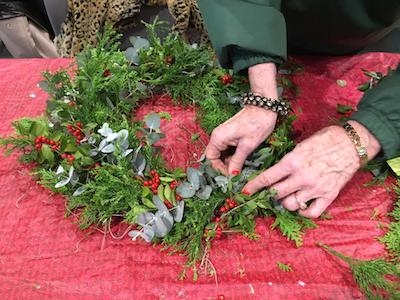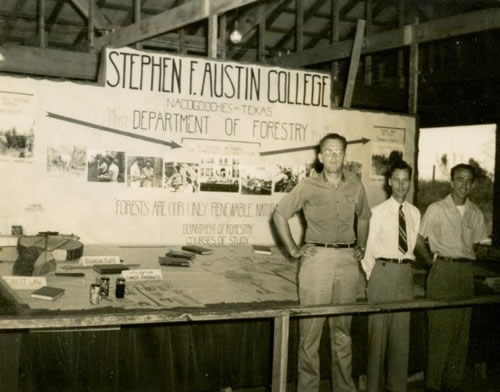SFA University

Stephen F. Austin State University’s College of Fine Arts will be renamed the Micky Elliott College of Fine Arts to recognize the Elliott family’s longtime support of the university and the late Micky Elliott’s love of the arts and the Nacogdoches community. The naming was announced in conjunction with the launch of the public phase of SFA’s $100 million fundraising campaign and was approved by SFA’s Board of Regents. Pictured are, from left, Karen Gantt, chair of the Board of Regents, Bill Elliott and SFA President Scott Gordon.
November 2, 2021 - Stephen F. Austin State University launched the public phase of its $100 million fundraising campaign in conjunction with Homecoming activities on Friday and announced plans to rename the College of Fine Arts in honor of a longtime Nacogdoches resident who had a deep love of the community and the arts.
The new name, the Micky Elliott College of Fine Arts, was approved Monday by SFA’s Board of Regents and recognizes the longtime support of the Elliott family and a recent gift of $8 million pledged to support scholarships for fine arts students.
“With this gift, Bill Elliott is honoring his late wife, providing for our current students and investing in the future of SFA,” said Dr. Scott Gordon, SFA president. “We are grateful for the way the Elliott family has elevated SFA through their generosity.”
Bill Elliott graduated from Louisiana Tech University with a degree in music. He began his career in the electrical distribution industry working for his father. With his own ideas of how a distributorship should be run, along with $20,000 of his own money and an $80,000 loan, Elliott and Micky began their first electrical supply company in Nacogdoches in 1972.
Today Elliott Electric Supply has more than 165 store locations across nine states. It has been recognized as one of the largest electrical distributors in Electrical Wholesaling Magazine, with more than 2,100 employees – 200 of those working at its Nacogdoches location.
“There are many great opportunities to help SFA build on its record of excellence,” Elliott said. “But having a degree in music, I was blown away with the quality of the students, programs and instructors in the College of Fine Arts. The college not only develops professional performers, but offers East Texas residents an opportunity to enjoy cultural opportunities that rival more metropolitan areas.”
Dr. Gary Wurtz, interim dean of fine arts, said the gift is a “game changer” for the School of Music.
“This generous gift will generate substantial scholarship dollars that will allow us to recruit more high-quality students than ever before, placing us in the position to compete against the biggest and best schools in the state and region — if not nationally — for those students,” Wurtz said. “Furthermore, there is an elevated status and pride that comes with being a named college, and we are excited about becoming the Micky Elliott College of Fine Arts.”
Other endowments that have been funded by the Elliott family include the Micky Elliott Symphony Orchestra Scholarship, Micky Elliott Computer Science Scholarship, Micky Elliott Engineering Professorship, the Gary Wurtz Jazz Scholarship and the Gene Moore Professorship.
“Bill Elliott remains an inspiration for his dedication to the East Texas community, and to his business and industry,” Gordon said. “A gift of this magnitude is monumental for SFA and allows us to boldly dream for SFA’s second century.”
Regents approved the renaming during their regular quarterly meeting, which concluded today.
More than $79 million has already been raised in conjunction with the capital campaign, including 12 donations of $1 million or more. More than 8,600 first-time donors have participated in the effort.
For more information about SFA fine arts, visit sfasu.edu/finearts. More about the campaign is available at sfasu.edu/elevate.
November 1, 2021 — Stephen F. Austin State University’s SFA Gardens will host the wreath-making seminar “Deck the Halls: Using Evergreens to Decorate for the Holidays” from 9 a.m. to noon December 11 at the Brundrett Conservation Education Building at the Pineywoods Native Plant Center, located at 2900 Raguet St.
Evergreen branches and garlands once served as symbols of enduring life and a fruitful year to come. Dawn Stover, SFA Gardens research associate, will teach participants how to create elegant wreaths and garlands using these and other materials from the garden.
The principles of wreath, garland and centerpiece construction will be discussed, and seminar-goers will make a wreath to take home for the holidays.
In addition to traditional wreaths and garlands, Stover will introduce new crafts using natural items from the garden and forest. All materials will be provided.
The cost is $30 for SFA Garden members and $40 for nonmembers. Class size is limited. To register in advance, call (936) 468-4129, or email romigad@sfasu.edu.

Stephen F. Austin State University’s SFA Gardens will host “Deck the Halls: Using Evergreens to Decorate for the Holidays” from 9 a.m. to noon Dec. 11 at the Brundrett Conservation Education Building at the Pineywoods Native Plant Center.
October 26, 2021 — For the first time since February 2020, Stephen F. Austin State University will host an in-person, on-campus Showcase Saturday event on Nov. 13, offering college-bound students and their families a unique opportunity to experience life as a Lumberjack.
“The vitality of SFA’s university community and beauty of its campus are things you just have to see to believe, which is why I’m ecstatic to once again welcome prospective students and their families in person at SFA’s Showcase Saturday,” said SFA President Dr. Scott Gordon. “Our Office of Admissions team did an amazing job meeting students where they were during the past year and a half, but there’s nothing quite like the excitement of our on-campus, open-house event.”
SFA’s Showcase Saturday provides an opportunity for college-bound students to spend a day experiencing university life firsthand, touring the campus and having all their college questions answered.
Registration and check-in will begin at 11 a.m. in the Baker Pattillo Student Center. Several optional early-bird sessions will be ongoing between check-in and the day’s opening program, which is scheduled for 1 p.m.
Those include a student services fair, campus tours and breakout sessions covering a range of topics, like campus safety, Veterans Affairs and the Hazlewood Act, and being a first-generation college student, among others.
“Our Showcase Saturday guests will learn all about the degree programs SFA has to offer as well as meet current students and tour the campus,” said Erma Nieto Brecht, SFA executive director of enrollment management. “We’re here to prepare students for the next huge and exciting step of pursuing higher education.”
During the opening program, students will attend presentations by college representatives based on their academic major of interest.
Come-and-go events will run from 1:30 to 4 p.m. These include an academic fair from 1:30 to 3:30 p.m. in the Student Recreation Center, tours of the residence halls and recreation center from 1:30 to 4 p.m., and a #JacksGetInvolved student organization fair from 2:30 to 4 p.m. in the outdoor student center plaza.
Thirty-minute breakout sessions will run from 2 to 4 p.m. and will cover such topics as financial aid, first-year and transfer admissions, and Residence Life.
In addition to a high-energy Lumberjack experience, participating prospective students will receive a free SFA T-shirt after completing a program evaluation form.
To register for SFA’s Showcase Saturday and for more information, visit sfasu.edu/showcase.
October 25, 2021 Nacogdoches - Stephen F. Austin State University’s horticulture program will host the annual Fall Plant Fair from 5 to 7 p.m. Thursday, November 4, at the SFA Plantery, located at 1924 Wilson Drive.
Plants available for purchase include a variety of winter annuals, such as pansies, violas, wallflowers, dianthus, stock, dusty miller and snapdragons. All plants are winter hardy and perform well in East Texas. Plants are $2 per pot or $34 for a tray of 18 plants.
“The students are so excited to show our community what they’ve learned about growing plants,” said Dr. Jared Barnes, associate professor of horticulture and steward of the Plantery. “We welcome people to tour the Plantery and buy some plants, since all proceeds support student learning.”
The Plantery, a program within the SFA Department of Agriculture, allows students to grow and raise plants in the Sprout microfarm, greenhouses and teaching gardens around the Agriculture Building.
The plant sale also is an opportunity to tour the plant-growing operation and view student projects, such as the gravel garden and hydroponic system.
Music, fireside s’mores and games will be provided by the SFA Horticulture Club.
In the event of rainy weather, the Fall Plant Fair will be postponed until Friday, November 5.
For more information, contact Barnes at barnesj@sfasu.edu. The community also may learn more about the horticulture program by visiting www.horticultureisawesome.com/the-plantery or by following @sfahorticulture on Instagram.
Sarah Fuller, Outreach Coordinator for Forestry and Agriculture
October 18, 2021 – The Stephen F. Austin State University Office of Multicultural Affairs will host a Native American Heritage Month Celebration beginning at noon, Wednesday, November 10 in the Baker Pattillo Student Center Plaza on the SFA campus.
The event is free and open to the public. Those interested in viewing virtually can do so on OMA’s Instagram page, @omasfa1991.
“It is important for us to celebrate and educate ourselves about various cultures in the world, and it is specifically important for us to celebrate every demographic represented on SFA’s campus,” said Veronica Beavers, OMA director.
Native American Heritage Month gives the public an opportunity to express their concerns and find solutions for building bridges of understanding and friendship in their local areas. The celebration also recognizes the significant contributions the first Americans made to establish and grow the United States. Former U.S. President George H.W. Bush established the commemorative month in 1990.
This year’s celebration will feature performances from the Alabama-Coushatta Tribe of Texas. The tribe operates a sovereign government with a full array of health and human services, including law enforcement and emergency services. The tribe comprises about 1,300 members with approximately half living on the reservation in Livingston.
“The goal is to learn about Native American culture. Specifically, at this event, participants will learn about the Alabama-Coushatta Tribe of Texas,” Beavers said.
During the event, OMA representatives will be available to provide resources regarding Native American Heritage Month. Participants also can partake in raffles.
For more information about OMA, or to see a list of events, visit sfasu.edu/oma.
By Nathan Wicker, senior marketing communications specialist at Stephen F. Austin State University
October 15, 2021 — The Stanley Center for Speech and Language Disorders at Stephen F. Austin State University has received a 2021 Speak Out and Loud Crowd grant from the Parkinson Voice Project, the only 501(c)(3) nonprofit organization in the world dedicated to helping individuals with Parkinson’s disease improve their speech and swallowing.
The center is among a select group of hospitals, university speech therapy clinics, private practices and nonprofit organizations worldwide to receive this funding. The grant provides free Speak Out training for the clinical instructors and graduate students in SFA’s speech-language pathology program. It also funds materials that are used in the Speak Out and Loud Crowd programs.
“Up to 90% of people with Parkinson’s are at high risk of losing their ability to speak, and complications account for a 70% mortality rate in this patient population,” said Parkinson Voice Project founder and CEO Samantha Elandary. “Our vision at Parkinson Voice Project is to make our highly-effective speech therapy program accessible to people with Parkinson’s worldwide.”
East Texas has a large population of people diagnosed with Parkinson’s disease, according to Deena Petersen, director of the Stanley Center for Speech and Language Disorders.
“We are fortunate to be trained in the Speak Out program to help these clients communicate better,” she said.
The clinic offers free therapy sessions to East Texans with Parkinson’s disease to help them learn how to speak with intent, Petersen said.
“People with Parkinson’s disease do not realize they are speaking softly, and people cannot hear them. In the Speak Out program, clients become more aware of their speech and learn that when they speak, it must be with intention.”
In addition to individual Speak Out sessions, the Stanley Center for Speech and Language Disorders offers the Loud Crowd program, which is a maintenance program for patients with Parkinson’s disease offering ongoing vocal practice, support and encouragement. When clients complete the Speak Out program, they transition to Loud Crowd.
The Parkinson Voice Project’s grant program honors Dr. Daniel R. Boone, a world-renowned speech-language pathologist and voice expert who recognized in the late 1950s that individuals with Parkinson’s disease could improve their communication if they spoke with intent. The Parkinson Voice Project combines individual and group therapy to convert speech from an automatic function to an intentional act.
For more information on the center’s services, call (936) 468-7109.
October 14, 2021 — All prospective graduate students and working professionals looking to advance their careers through graduate study are invited to attend Stephen F. Austin State University’s first virtual graduate school informational session.
Representatives from SFA’s Office of Research and Graduate Studies will present a one-hour overview about applying for and attending graduate school. The virtual info session also will review SFA’s own master’s degree, doctoral degree and certification programs.
“We understand that many who are interested in a graduate-level education face real life constraints, including time and distance,” said Dr. Freddie Avant, interim dean of research and graduate studies. “Our virtual information session is intended to bring the answers directly to you.
“Whether you’re transitioning straight out of an undergraduate program into graduate study or looking for professional advancement, this info session will answer all of your questions about making graduate school work for your schedule,” he added. “With more than a dozen fully online SFA graduate programs, it’s more possible than ever before to pursue graduate study while still balancing a family, a full-time job or any other pursuits.”
The virtual session will begin at 6:30 p.m. Nov. 9. Avant and Dr. Lorenzo Smith, SFA’s provost and executive vice president for academic affairs, will kick off the session with a welcome message. Details on graduate school requirements and the application process will follow, as will breakout rooms discussing SFA’s own graduate programs.
Optional Q&A sessions will close out the info session, where attendees can connect with representatives of SFA’s Steen Library, Center for Teaching and Learning, SFA Online, Office of Financial Aid and Scholarships, and the Veterans Resource Center.
For more information and to register, visit sfasu.edu/graduate-admissions.

This year marks the 75th anniversary of Stephen F. Austin State University’s forestry program. Following the program’s 1966 accreditation from the Society of American Foresters, the national organization representing and setting the standard for the forestry profession, SFA became home to the first accredited forestry program in the state. Since its establishment, the forestry program has produced top leaders in both the public and private sectors of natural resource management. In this picture dated 1949, representatives of the new Department of Forestry stand before a student recruiting booth.
October 13, 2021 — In the spring semester of 1946, Stephen F. Austin State Teachers College welcomed an influx of returning World War II servicemen to the student body. Among the courses offered to these new and returning students was an entirely new academic program — one that is inexorably tied to the heritage, economy and natural history of the region.
By the mid 20th century, the U.S. had transitioned away from viewing forests and their resources as purely extractive, and the creation of SFA’s Bachelor of Science in Forestry program reflected the growing understanding of the need for responsible, renewable, science-based forest management.
In 1966, the program received accreditation from the Society of American Foresters, the national organization representing and setting the standard for the forestry profession, making SFA home to the first accredited forestry program in the state.
The new Department of Forestry was initially housed in the basement of the Austin Building, and although campus location, technology and course offerings have changed during the past 75 years, one aspect has remained consistent.
“I think one of our strengths is that we have held on to the hands-on, learning-based experience model,” said Dr. Hans Williams, dean of SFA’s Arthur Temple College of Forestry and Agriculture. “Our students go to the forest and field every day to work closely with faculty members and learn.”
The field-based curriculum is perhaps best exemplified by the program’s intensive six-week summer field camp for students entering their junior year. Each week of the course focuses on a different aspect of the forestry profession and challenges students to apply the knowledge they have gained throughout the program to real-world scenarios.
For most of the program’s history, the camp took place off campus — first at a leased property equipped with dormitories and a dining hall near Milam, and later at the SFA-owned Piney Woods Conservation Center on Lake Sam Rayburn. In 2015, the camp transitioned to a non-residential format with students returning to their respective homes each night. Although locations of the camp have changed, the physical and mental rigor remain.
“Before I started field station, my friends told me that it’s the most fun you will never want to have again,” said Charlie Jordan, 2015 forestry graduate. “They were 100% correct. I’ve never had more fun during a summer class, but I never want to go through that mental and physical exhaustion again.”
Although tucked away in rural Texas Forest Country, SFA’s forestry program, faculty members and students have gained national recognition for their contributions to the profession.
Currently, the program is home to four faculty member recipients of the Carl Alwin Schenck Award. This national award, presented by the Society of American Foresters, recognizes outstanding performance in the field of forestry education. Additionally, the student chapter of The Wildlife Society and the student chapter of the Society of American Foresters have been recognized as the nation’s top-performing student chapters. Furthermore, the SFA Sylvans, the university’s timbersports team, has won multiple Southern Forestry Conclave championships, excelling in both the academic and physical portions of the competition.
When contemplating the program’s greatest accomplishments, Williams immediately points to alumni.
“When you get down to it, the success of any program is based on the success of its graduates, and I think what you see with our graduates is that they have achieved leadership positions in the public and private sectors of forestry all over the country,” Williams said. “Because we’re such a large program and have graduated so many students over the years, we’ve gained a reputation through their success of being a fine forestry program that produces strong graduates.”
Among the program’s notable alumni are a Nobel Prize co-recipient and top scientist for the U.S. Geological Survey, as well as top leaders within the Texas A&M Forest Service, Texas Parks and Wildlife Department and private companies such as Weyerhaeuser and Davey Tree Expert Company.
“What amazes me is that as we try to select alumni for our Outstanding Alumni Award, we can’t seem to catch up,” Williams said. “We are so far behind in recognizing our outstanding alumni who have made great contributions to the profession.”
In addition to extensive teaching, research and outreach, the program manages 3,449 acres of East Texas forestland through the Lumberjack Legacy Forest Program. Through sustainable forest management, these properties have sequestered more than 600,000 tons of carbon dioxide and generated more than $239,000 for student scholarships and graduate research.
The Lumberjack Legacy Forest Program initially began in 2000 through a relationship with STMicroelectronics, a global electronics and semiconductor manufacturer focused on reducing its carbon footprint. The company purchased and afforested marginal East Texas pastureland and then donated the land to the SFA Real Estate Foundation to be managed in perpetuity by the college.
“This relationship was made possible through the vision and leadership of past deans and faculty members, as well as guidance from the SFA development office,” Williams said. “We have been able to meet STMicroelectronics’ goals, as well as our goals of supporting students and facilitating faculty development.”
While the forest industry and higher education have dramatically changed during the past 75 years and will no doubt continue to evolve, Williams speaks of the future of SFA’s forestry program with enthusiasm and purpose.
“We will continue to hold on to hands-on, experienced-based learning,” Williams said. “I think that is part of our culture, what we are known for and why employers seek out our graduates. We will continue to seek out ways to improve our academic quality and produce well-rounded professionals."
Story by Sarah Fuller, outreach coordinator for Stephen F. Austin State University’s Arthur Temple College of Forestry and Agriculture.

The public is invited to join Stephen F. Austin State University’s College of Sciences and Mathematics and Bruce McCandless III for an evening of space stories about his father, astronaut Bruce McCandless II, at 6 p.m. October 14, in the SFA planetarium.
October 12, 2021 — The public is invited to join Stephen F. Austin State University’s College of Sciences and Mathematics and Bruce McCandless III for an evening of space stories about his father, astronaut Bruce McCandless II, at 6 p.m. October 14, in the SFA planetarium.
The book, “Wonders All Around: The Incredible True story of Astronaut Bruce McCandless II and the First Untethered Flight in Space,” was written by McCandless III and details pivotal moments in his father’s career, which spanned the Apollo era and the Skylab and shuttle programs. An Amazon best seller, the book was recently listed by Men’s Journal as a Top 20 Book to Read in 2021.
“You’ve probably seen the photo — that all-but-ubiquitous snapshot of an astronaut with a jet-powered backpack gliding along in the vastness of the cosmos, untethered and unafraid,” McCandless III said. “Other than that fantastic image, though, you may know very little about the man in the jetpack: Captain Bruce McCandless II.”
Some of McCandless II’s accomplishments include serving as a capsule communicator for Neil Armstrong’s Apollo 11 moon walk, repairing the damaged Skylab orbital workshop, performing the first untethered flight in space, and designing and deploying the Hubble Space Telescope.
The presentation is free to the public.
Learn more about the SFA Planetarium at sfasu.edu/planetarium.
By Joanna Armstrong, marketing communications specialist at Stephen F. Austin State University
October 6, 2021 – Stephen F. Austin State University’s SFA Gardens will host its annual Fabulous Fall Festival Plant Sale from 9 a.m. to 2 p.m. Saturday, Oct. 9 and Sunday, Oct. 10, at the Pineywoods Native Plant Center, 2900 Raguet St., in historic Nacogdoches.
The sale will feature a remarkable array of hard-to-find, “Texas-tough” plants, including natives, edibles, heirlooms, perennials, shrubs and trees,with an emphasis on native, pollinator-friendly selections, as well as exclusive SFA introductions. The featured plants are extensively trialed before being offered to the public and are produced by staff members and volunteers of the SFA Gardens.
This popular event raises money for operations of all the gardens under the SFA Gardens umbrella: SFA Mast Arboretum, PNPC, Ruby M. Mize Azalea Garden, Gayla Mize Garden, Jimmy Hinds Park and the alternative fruits research program.
Parking will be available at SFA’s Janice A. Pattillo Early Childhood Research Center, 2428 Raguet St., and visitors are encouraged to arrive early and bring a wagon for their plants. Credit cards and checks will be accepted; no cash.
For more information and a list of available plants, call (936) 468-4404 or visitsfagardens.sfasu.edu two weeks before the sale.








